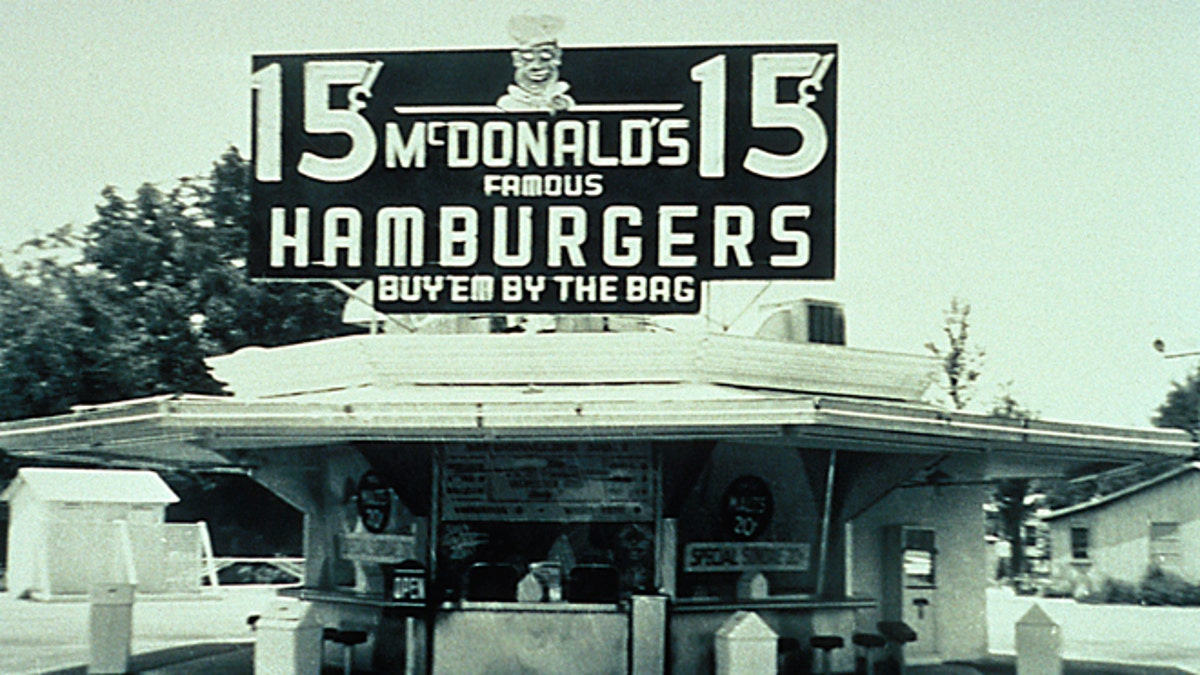
McDonald Brother's store in San Bernadino, California with a 15-cent hamburger sign. (McDonald's)
The iconic hamburger that we know and love today is very much an American invention, according to "The Hamburger: A History" by Josh Ozersky. However, the true identity of its inventor is still open for debate. Here is a brief history of the early hamburger.
Hamburg steak
Minced or chopped beef was a popular dish in Hamburg, Germany in the nineteenth century. This so-called Hamburg steak was a familiar dish for the German immigrants that left Hamburg for the United States. It was also perfect for New York City because it was filling and could be easily eaten while standing up or on the go. Hamburg steak can be found on a menu from New York's Delmonico's that was printed back in 1837.
Who is the father of the hamburger?
It is not clear who is responsible for the first hamburger. It may be "Hamburger Charlie" Nagreen, who is said to have sold meatballs between two pieces of bread at a fair in Seymour, Wis. in 1885. He is said to have called this sandwich the "hamburger." However, others believe that Frank and Charles Menches, two brothers from Ohio, sold their ground beef sandwich in Hamburg, N.Y. in 1885, making them the supposedly fathers of the hamburger.
Yet another claim comes from New Haven, Conn. Louis Lassen reportedly served some ground beef trimmings between two slices of toast in 1900. And then there was "Uncle" Fletcher David, a Texan who is said to have created the hamburger in the late 1880s. Legend has it that Uncle Fletcher brought his sandwich to St. Louis for the 1904 World's Fair, where it was dubbed the "hamburger." Critics argue that this ground beef sandwich was served on simple slices of bread rather than a bun, so it cannot claim to be the first hamburger.
In April 1995, the governor of Oklahoma proclaimed that Tulsa is, in fact, the real birthplace of the hamburger. Oscar Weber Bilby is said to have served the first hamburger, bun and all, in 1891 at a Fourth of July part just west of what is now Tulsa.
Hamburger becomes a fast food favorite
So, we know that the hamburger was around by the turn of the twentieth century, but Alan Rocke, a history professor at Case Western Reserve University, says that doesn't mean it was respected back then.
"It was considered questionable food except for workingmen's lunches, as hamburgers were commonly 'mystery meat' served in small greasy-spoon short-order diners, often set up near factories," Rocke says.
With the arrival of the automobile and the public desire for on-the-go meals came a reputation makeover for the hamburger. White Castle -- yes, the same one that Harold and Kumar embark on a journey to find -- became the first fast food burger chain. It was founded in Wichita, Kan. in 1921.
"'White' was chosen to escape the public perception that hamburgers were unsanitary," Rocke explains, "[and] 'Castle' to evoke a higher-class product."
The cheeseburger and the golden arches
Lionel Sternberger is said to have added cheese to the burger in the mid-1920s while working as a short-order cook in Pasadena, Calif.
Ray Kroc opened the first McDonald's franchise restaurant in Des Plaines, Ill. in 1955, establishing the McDonald's that we know today. As Tom Robbins wrote in Esquire in 1983, "Columbus discovered America, Jefferson invented it, Lincoln unified it, Goldwyn mythologized it, and Kroc Big Mac'd it."
Today, McDonald's restaurants serve 68 million people every day and can be found in 119 countries. Wendy's and Burger King round out the top three biggest hamburger chain by volume.